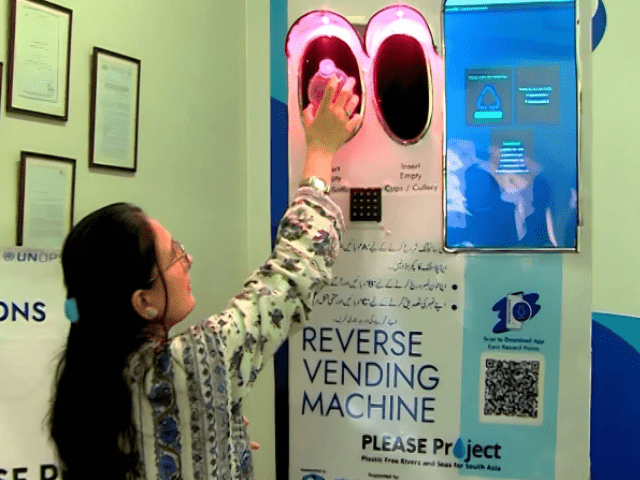A new environmentally friendly initiative has been launched in Lahore aimed at tackling plastic pollution by incenting citizens to recycle used plastic bottles, it appeared on Monday.
During the program, residents can deposit empty plastic bottles in reverse vending machines (RVMs) and earn up to RS1,000 in “Green Credit” per day. Kg of plastic-ca. 20 one and a half liter of bottles.
The project, led by the ISP Environmental Solutions with the support of the Intratech group and the World Bank, is part of Punjab’s environmental protection agent’s green credit program. The project aims to transform how urban waste is managed and perceived by offering financial incentives in exchange for used plastic.
Lahore produces approx. 500 tonnes of plastic waste daily, of which very contaminate waterways and landfills, according to Intratech Group chairman Gulfam Abid.
“These new reverse vending machines will collect plastic products for disposable, including bottles, cups and plates,” he explained. “The collected material will be recycled in raw materials for trails, road repairs and environmentally sustainable bricks.”
Read: Tariff cutting on chemicals, plastic stokes concerns
Each RVM is able to store up to 25 kg of plastic and is equipped with weight-sensitive sensors that reject non-plastic materials. Users simply insert the bottles into a designated slot, press button “A”, enter their mobile number, and press button “B” to see their credit information on the screen. The same information is also available via a dedicated mobile application.
The app not only tracks credit but also connects users directly with waste dealers. Citizens can sell their plastic through the platform, and business representatives will collect the goods from their location. More than 18,000 local scrap dealers have been aboard the system and they can also earn green credit beyond their regular profits.
In the initial phase, the machines are installed at four private universities in Lahore. Later, the project will expand to both public and private spaces.
While the machines are locally manufactured in Pakistan, they incorporate advanced Chinese technology. Each device costs around RS800,000 to produce.
An “ECO brick” has also been created in Sundar Industrial Estate as part of the program. It will produce bricks of design quality using the collected plastic. The inauguration of the plant is scheduled for July.
Officials emphasize that the project goes beyond just installing machines – its wider goal is to instill a sense of environmental management among the public. “We want people to see plastic not as waste, but as a valuable resource that can be reused for environmental and financial gain,” said an official.



